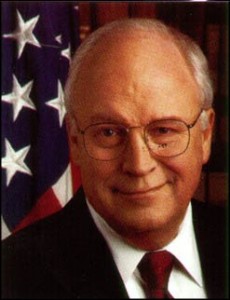
Former Vice President Dick Cheney
Former Vice President Dick Cheney, out promoting his new book Heart about how his life was saved by very expensive heart-transplant surgery, is simultaneously praising the Tea Party, which is hard at work trying to prevent less fortunate Americans from getting anything close to the government-financed care that spared Cheney.
In an appearance on NBC's "Today" show, Cheney called the Tea Party and its fierce opposition to government spending a "good thing." He also noted how the Tea Party made possible the insurgent Wyoming Senate campaign of his daughter Liz because she was "partly motivated" by the same concerns about high taxes, high national debt and the cost of the Affordable Care Act.
But what the Tea Party has been doing is trying to prevent the federal government from implementing reforms in the health-insurance system that would enable some 30 million Americans, including many with pre-existing conditions, to obtain insurance often at reduced or subsidized prices. The Tea Party is also fighting expansion of Medicaid for poor families in states controlled by Republicans. Out of that zeal to repeal Obamacare, the Tea Party and its congressional adherents provoked this month's government shutdown and near credit default. Yet, Cheney declared, "I've got a lot of respect for what the people are doing."
In other words, the Tea Party wants to force Americans with pre-existing medical conditions -- like, say, a diseased heart -- to remain at the mercy of greedy insurance companies that have made a lucrative business plan out of denying coverage to the people who need it most.
Such a victim of America's perverse health-care system would have been Dick Cheney, who has had at least five heart attacks dating back to when he was 37. But Cheney was lucky enough to qualify for government-funded health care as a federal employee for most of his adult life, including his time in the Nixon administration, his service in Congress, and his eight years as vice president. As a retired official who is now over 65, he further qualifies for Medicare and other health benefits.
The cost of the heart transplant alone over the first year is estimated at $1 million, and the 72-year-old Cheney has received a variety of other expensive heart procedures over the decades.
Saving the Cheney Family
But Cheney's personal hypocrisy regarding the federal government's role to "provide for ... the general Welfare" when it comes to less fortunate Americans did not start with the life-saving gift of a new heart. It traces back to the Cheney family's rise from the hard-scrabble life that confronted many hard-working Americans who were buffeted by the periodic financial crises of unrestrained capitalism, the system idealized by the Tea Party.
In Cheney's 2011 memoir, In My Time, he acknowledges that his personal success was made possible by Franklin Roosevelt's New Deal and the fact that Cheney's father managed to land a steady job with the federal government. "I've often reflected on how different was the utterly stable environment he provided for his family and wondered if because of that I have been able to take risks, to change directions, and to leave one career path for another with hardly a second thought," Cheney wrote.
In that sense, Cheney's self-assuredness may be as much a product of the New Deal as the many bridges, dams and other public works that Roosevelt commissioned in the 1930s to get Americans back to work. By contrast, the insecurity that afflicted Cheney's father was a byproduct of the vicissitudes from laissez-faire capitalism.
In sketching his family's history, Cheney depicted the struggles of farmers and small businessmen scratching out a living in the American Midwest and suffering devastating reversals whenever the titans of Wall Street stumbled into a financial crisis and the bankers cut off credit.
After his ancestors would make some modest headway from their hard work, they would find themselves back at square one, again and again, because of some "market" crisis or a negative weather pattern. Whenever there was a financial panic or a drought, everything was lost.
"In 1883, as the country struggled through a long economic depression, the sash and door factory that [Civil War veteran Samuel Fletcher Cheney] co-owned [in Defiance, Ohio] had to be sold to pay its debts," Cheney wrote. "At the age of fifty-four, Samuel Cheney had to start over," moving to Nebraska.
There, Samuel Cheney built a sod house and began a farm, enjoying some success until a drought hit, again forcing him to the edge. Despite a solid credit record, he noted that "the banks will not loan to anyone at present" and, in 1896, he had to watch all his possessions auctioned off at the Kearney County Courthouse. Samuel Cheney started another homestead in 1904 and kept working until he died in 1911 at the age of 82.
His third son, Thomas, who was nicknamed Bert (and who would become Dick Cheney's grandfather), tried to build a different life as a cashier and part owner of a Sumner, Kansas, bank, named Farmers and Merchants Bank. But he still suffered when the economy crashed.
"Despite all his plans and success, Bert Cheney found that, like his father, he couldn't escape the terrible power of nature," Dick Cheney wrote. "When drought struck in the early 1930s, farmers couldn't pay their debts, storekeepers had to close their doors, and Farmers and Merchants Bank went under. ... My grandparents lost everything except for the house in which they lived."
(Note: You can view every article as one long page if you sign up as an Advocate Member, or higher).





